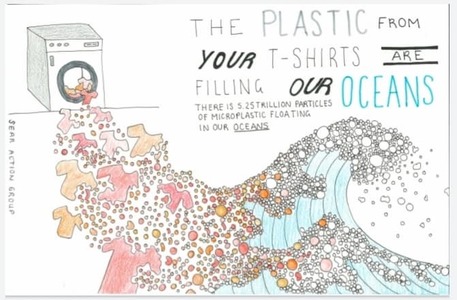500 signatures reached
To: Individuals
Stop Microfiber Pollution

As the world is beginning to realise that our current lifestyle isn’t quite the best for our own health and for our environment, microfiber pollution has become an untalked about issue currently happening on our planet, where more than 5.35 trillion microfiber particles shedded from synthetic clothing is in our oceans. How do they get there? Our washing machines! Microfibers being shed from synthetic garments are able to make their way from washing machines, travel through drains and end up in waterways.
By signing this pledge, we would like people to support action on eradicating microfibers from New Zealand to protect our rivers, oceans and environment.
By signing this pledge, we would like people to support action on eradicating microfibers from New Zealand to protect our rivers, oceans and environment.
Why is this important?
Synthetic fibers, such as polyester, nylon and acrylic, make up 60% of the clothing material used in the fashion industry worldwide.
These fibers are used as a cheap source of material for fast fashion businesses and although the clothing produced from these materials are usually low quality, these materials have made their way into everyone's wardrobe.
However, the harmful environmental impacts around clothing made from synthetic fibers have become an undiscussed topic of environmental issues currently occurring on our planet.
These synthetic materials are man-made, where polyester for example is made from petroleum. The recent report form Tearfund explains that more than 70 million barrels of oil is used to create polyester each year, which is extremely carbon-intensive as it is a non-renewable resource. As these synthetic fibers are essentially made from plastic, it is non-biodegradable meaning every single micro plastic produced to create these fibers will stay on our planet forever. Producing polyester also uses harmful chemicals which can be emitted into the air and water, leading to damage the environment as well as our own health.
Items of clothing made from polyester, acrylic and nylon have plastic microfibers, and with each wash these plastic fibers shed off from the clothing to make their way from washing machines into our oceans. Unfortunately, sewage treatment plants can not effectively filter these microfibers.
This leads to microfibers currently being recognised as one of the biggest sources of microplastic pollution currently in our oceans. A single polyester garment can release up to 1900 microfibers in one wash. When you add this all up, it is currently estimated that 5.25 trillion microfiber particles are currently in our oceans, with an increase of 6.4 million tons of microfibers entering our oceans each year.
This further poisons the food chains, as these fibers are consumed by fish and wildlife which is extremely harmful to their health, and it can also lead for humans to ingest these fibers ourselves. It is estimated that people who eat seafood ingest 11,000 microplastics each year.
We need to switch to more sustainable methods of living if our oceans, our wildlife, our planet our own lives are going to make it to the end of the century.
Join us in this movement, let’s make change together #stopmicrofibers
- SEAR Action Group
These fibers are used as a cheap source of material for fast fashion businesses and although the clothing produced from these materials are usually low quality, these materials have made their way into everyone's wardrobe.
However, the harmful environmental impacts around clothing made from synthetic fibers have become an undiscussed topic of environmental issues currently occurring on our planet.
These synthetic materials are man-made, where polyester for example is made from petroleum. The recent report form Tearfund explains that more than 70 million barrels of oil is used to create polyester each year, which is extremely carbon-intensive as it is a non-renewable resource. As these synthetic fibers are essentially made from plastic, it is non-biodegradable meaning every single micro plastic produced to create these fibers will stay on our planet forever. Producing polyester also uses harmful chemicals which can be emitted into the air and water, leading to damage the environment as well as our own health.
Items of clothing made from polyester, acrylic and nylon have plastic microfibers, and with each wash these plastic fibers shed off from the clothing to make their way from washing machines into our oceans. Unfortunately, sewage treatment plants can not effectively filter these microfibers.
This leads to microfibers currently being recognised as one of the biggest sources of microplastic pollution currently in our oceans. A single polyester garment can release up to 1900 microfibers in one wash. When you add this all up, it is currently estimated that 5.25 trillion microfiber particles are currently in our oceans, with an increase of 6.4 million tons of microfibers entering our oceans each year.
This further poisons the food chains, as these fibers are consumed by fish and wildlife which is extremely harmful to their health, and it can also lead for humans to ingest these fibers ourselves. It is estimated that people who eat seafood ingest 11,000 microplastics each year.
We need to switch to more sustainable methods of living if our oceans, our wildlife, our planet our own lives are going to make it to the end of the century.
Join us in this movement, let’s make change together #stopmicrofibers
- SEAR Action Group
